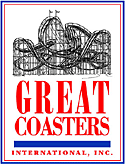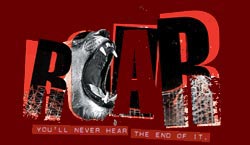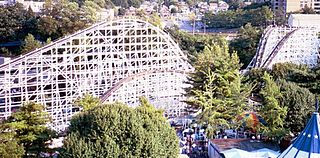
Hersheypark is a family theme park in the eastern United States in Hershey, Pennsylvania, about fifteen miles (25 km) east of Harrisburg, and 95 miles (155 km) west of Philadelphia. The park was founded in 1906, by Milton S. Hershey as a leisure park for the employees of the Hershey Chocolate Company. It is wholly and privately owned by Hershey Entertainment and Resorts Company. Hersheypark has won several awards, including the Applause Award.

A wooden roller coaster is a type of roller coaster classified by its wooden track, which consists of running rails made of flat steel strips mounted on laminated wood. The support structure is also typically made of wood, but may also be made of steel lattice or truss, which has no bearing on a wooden coaster's classification. The type of wood often selected in the construction of wooden coasters worldwide is southern yellow pine, which grows abundantly in the southern United States, due to its density and adherence to different forms of pressure treatment.

A stand-up roller coaster is a roller coaster where passengers aboard a train stand throughout the course of the ride. The first manufacturer to employ the format was TOGO, a Japanese company that converted two traditional roller coasters in 1982 to stand-up configurations. Arrow Dynamics followed suit in the United States the following year with their own conversion. The first roller coaster designed from the ground up as a stand-up coaster was King Cobra, built by TOGO, which opened at Kings Island in 1984. Intamin and Bolliger & Mabillard (B&M) have also designed stand-up models beginning in the 1990s, with the latest opening in 2023 as Pipeline: The Surf Coaster in SeaWorld Orlando.

Philadelphia Toboggan Coasters (PTC) is one of the oldest existing roller coaster manufacturing companies in the world. Based in Hatfield, Pennsylvania, it was established in 1904 by Henry Auchey and Chester Albright under the name Philadelphia Toboggan Company. The company manufactured carousels, wooden roller coasters, toboggans and later, roller coaster trains.

Lagoon is a family owned amusement park in Farmington, Utah, United States, located about 18 miles north of Salt Lake City. It has eleven roller coasters, six of which are unique; Colossus the Fire Dragon, the last Schwarzkopf Double Looping coaster still in operation in the United States ; Roller Coaster, one of the oldest coasters in the world operating since 1921; Wicked, designed by Lagoon's engineering department and Werner Stengel in cooperation with ride manufacturer Zierer; BomBora, a family coaster designed in-house; Cannibal, built in-house with one of the world's steepest drops, and Primordial, an interactive dark ride coaster/3-D shooter game attraction built mostly inside a massive artificial mountain.

Six Flags Magic Mountain, formerly known and colloquially referred to as simply Magic Mountain, is a 209-acre (85 ha) amusement park located in Valencia, California, 35 miles (56 km) northwest of downtown Los Angeles. It opened on May 29, 1971, as a development of the Newhall Land and Farming Company and Sea World Inc. In 1979, Six Flags purchased the park and added "Six Flags" to the park's name.

Carowinds is a 407-acre (165 ha) amusement park primarily located in Charlotte, North Carolina. Owned and operated by Cedar Fair, the park opened to the public on March 31, 1973. Carowinds straddles the state line between North and South Carolina, adjacent to Interstate 77, with a portion of the park located in Fort Mill, South Carolina. It was constructed at a cost of $70 million following a four-year planning period led by Charlotte businessman Earl Patterson Hall. Carowinds also features Carolina Harbor, a 27-acre (11 ha) water park that is included with park admission. Annual events include the Halloween-themed S-Carowinds and the Christmas-themed WinterFest.

Casino Pier is an amusement park situated on a pier, in Seaside Heights, New Jersey. The pier opened in 1932 and formerly extended approximately 300 ft (91 m) into the Atlantic Ocean from the narrow strip of the Barnegat Peninsula, including approximately six blocks within Seaside Heights.

Great Coasters International, Inc. is a Sunbury, Pennsylvania-based roller coaster manufacturer which has created several award-winning rides since its formation in 1994. Starting in 2006 with Thunderbird at PowerPark in Finland, the company expanded beyond the United States and began building coasters in Europe and Asia. Günter Engelhardt GmbH handles the company's marketing rights in Europe. In addition to building new roller coasters, GCI also refurbishes and re-tracks existing roller coasters, regardless of manufacturer.
Lincoln Park was a park opened in 1894 by the Union Street Railway Company of New Bedford, Massachusetts, located in North Dartmouth, Massachusetts on the border of Westport, Massachusetts on U.S. Highway 6. Lincoln Park closed in 1987 and remained abandoned and vacant until the Comet roller coaster was torn down on July 11, 2012.

The Comet was a twister-layout wooden roller coaster that operated in the now defunct Lincoln Park in Massachusetts. It operated from 1946 until 1987.

Roar is the name of a wooden roller coaster at Six Flags America located near Upper Marlboro, Maryland. There were originally two roller coasters; the first and current ride was built in 1998 at Six Flags America, and a second ride was built in 1999 at Six Flags Discovery Kingdom. Both rides were designed and built by Great Coasters International (GCI). In 2015, Discovery Kingdom announced the retirement of its version of Roar, which Rocky Mountain Construction later renovated and transformed into The Joker, a hybrid roller coaster.

Comet is a wooden roller coaster at Hersheypark in Hershey, Pennsylvania. It is located in the Hollow section of Hersheypark, next to Skyrush. Built in 1946 by the Philadelphia Toboggan Coasters (PTC) of Philadelphia, Pennsylvania, the coaster features a double out and back track layout. When built it was jointly owned by Hershey Park and PTC. The maximum speed is 50 miles per hour (80 km/h).
John A. Miller was an American roller coaster designer and builder, inventor, and businessman. Miller patented over 100 key roller coaster components, and is widely considered the "father of the modern high-speed roller coaster." During his lifetime, he participated in the design of approximately 150 coasters and was a key business partner and mentor to other well-known roller coaster designers, Harry C. Baker and John C. Allen.

Whalom Park was an amusement park located on Lake Whalom in Lunenburg, Massachusetts, that operated from 1893 to 2000. The site was redeveloped into a 240-unit apartment complex.

Kentucky Rumbler is a wooden roller coaster at Beech Bend Park in Warren County, Kentucky. It has a drop of 80 feet and a height of 96 feet. Before Kentucky Rumbler, the park did not have a signature ride, and it is the most popular ride in the park.

A Suspended Family Coaster is a steel inverted roller coaster built by Vekoma designed for families with no inversions. Just like all inverted roller coasters the train runs under the track with the seats directly attached to the wheel carriage. This latter attribute is what sets it apart from the older suspended swinging coaster, which runs under the track, but "swings" via a pivoting bar attached to the wheel carriage.

Ravine Flyer II is a hybrid wooden roller coaster located at Waldameer Park in Erie, Pennsylvania, United States. It was ranked as the best new ride of 2008 by Amusement Today magazine. Ravine Flyer II was built at the site of the park's old Ravine Flyer coaster, which was removed in 1938 after a man died on it. Initial concepts for the replacement ride were developed by Custom Coasters International in the early 1990s, further developed by Dennis McNulty several years later, then finalized and constructed by The Gravity Group with Jeff Mason overseeing construction.

Cascade Park is a nature park and former amusement park in New Castle, Pennsylvania. The park was originally known as Big Run Falls when the area on which the park sits was purchased by Col. Levi Brinton in 1892. Power companies at the turn of the twentieth century found they could make profits developing amusement parks, so in 1897, the New Castle Traction Company bought the property from Col. Brinton. When the company held a contest for the park's name, ten-year-old Regina Norris won ten dollars for submitting the name Cascade Park. The park opened on May 29, 1897. The park was accessible not only via local trolley service but also via the Pittsburgh, Harmony, Butler and New Castle Railway, which later became the Harmony Short Line Motor Transportation Company' bus company.

Ride Entertainment is a firm based in the United States specializing in the construction, sales, service, and operation of amusement rides and attractions.


















